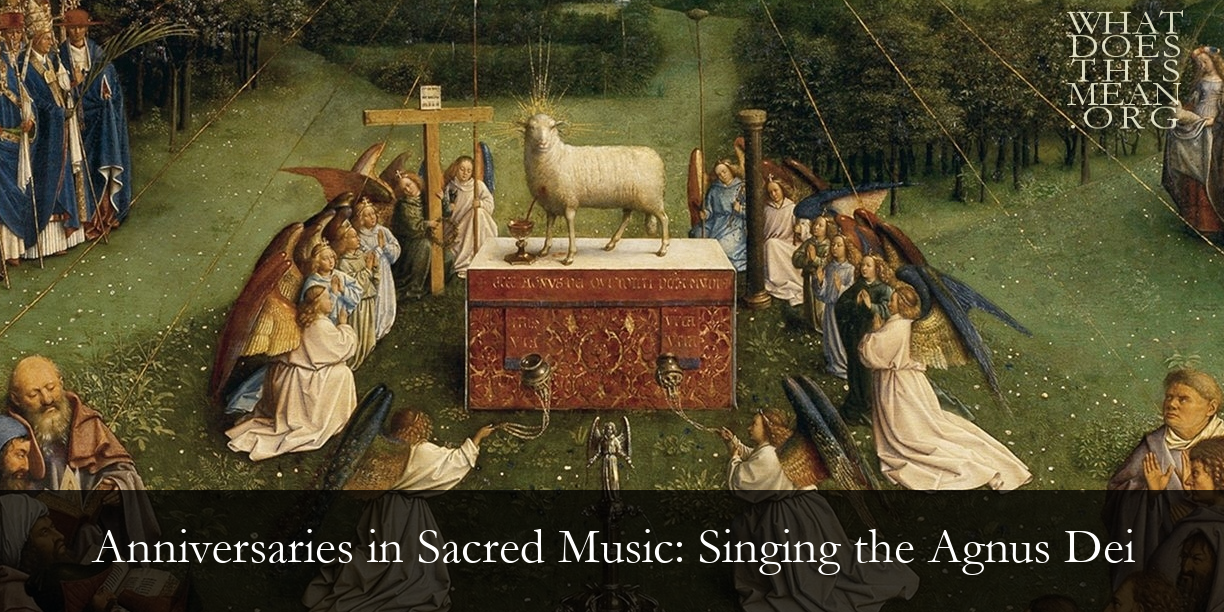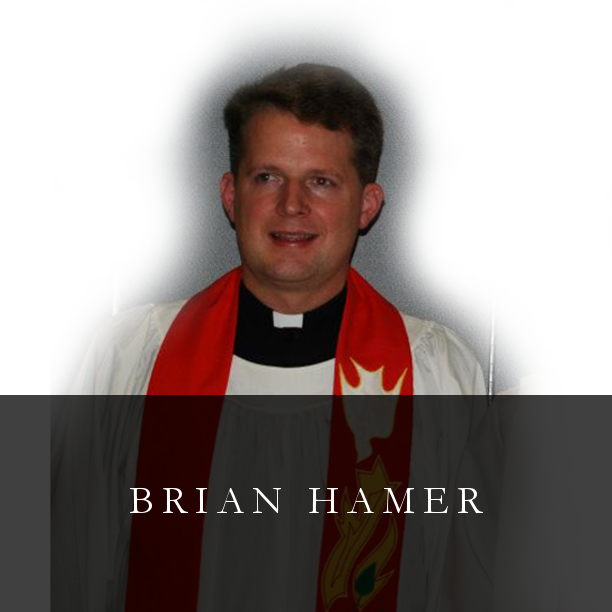Peace in our time, O send us!
[The Agnus Dei] is the fifth and final great hymn of the Divine Service. The words, “Behold! The Lamb of God who takes away the sin of the world!” were first spoken by John the Baptist in the public announcement of Jesus’ ministry. These words are the sum and substance of what our Lord came to do. (Lutheran Catechesis, p. 119)
Dale Warland describes Martin’s setting of the Agnus Dei: “[T]he two choirs sing much of the same material a half-beat apart. The gently jagged rhythm, the sad, sweet harmonies and the arching melodies make this concluding plea for mercy one of the most touching moments in the Mass” (ACC CD 120 liner notes). Singing a half-beat apart is known as stretto, which allows for imitation between the choirs, but results in lack of clarity in the texture, perhaps depicting the spiritual “dissonance” that the Lamb must be slain. Similarly, the sad and sweet harmonies might create an overtone of Jesus’ Passion. But the arching melodies are clear and serene, floating high above the dissonance to preach the good news that Jesus is the Lamb of God. Composers often “soften” their approach at the final plea, “Grant us peace,” even as Martin brings his setting down to earth in the closing moments.
What do you think is the most endearing trait of Martin’s setting of the Agnus Dei?
| Agnus Dei, qui tollis peccata mundi: miserere nobis, dona nobis pacem. | Lamb of God who takes away the sins of the world: have mercy on us, grant us peace. |
Ralph Vaughan Williams (RVW) was also writing his Agnus Dei between the world wars, but with one very important difference from Martin: RVW served in World War I. Contributors to Grove Music Online note that despite his age—he was forty-two in 1914—RVW volunteered for military service, joining the Royal Army Medical Corps as a private. In this capacity he drove ambulance wagons in France and later in Greece. Old enough to be the father of many corpsmen, the work must have been physically punishing. The war of course left its emotional mark on RVW, who lost many friends and cohorts.
But there is more. In 1917 RVW was commissioned as a lieutenant in the Royal Artillery, seeing action in France from March 1918. The continual noise of the guns damaged his hearing and led to deafness in his later years. After the armistice in 1918 he served as director of music for the British First Army until February 1919. Writing in the May 2022 RVW anniversary issue of BBC Music Magazine, Stephen Johnson summarizes the impact of war on RVW: “[H]is traumatic experience as a medical orderly in the trenches in the First World War was to cast a colossal shadow over many of his major works” (p. 26).
As a combat veteran, the petition “Grant us peace” at the end of the Agnus Dei carried a special meaning for RVW. (He also wrote a major work for chorus and orchestra, Dona Nobis Pacem, which the reader might wish to explore.) Throughout the Agnus Dei there is a strong sense of pleading and urgency, from a composer who knew something about bloodshed, combat, and making the ultimate sacrifice. The phrase “Grant us peace” is but the last three words of the text of the Agnus Dei, but it occupies nearly half of RVW’s music. One reviewer captured it well: “The warmest flush of emotional colour is held back with art until the Agnus Dei, and there the composer has allowed himself a lyric utterance which tells admirably, and the Mass ends with this cry still in the air” (The Musical Times 64:959, p. 37).
As you listen to the “warmest flush of emotional colour,” consider the emotive power of this music in the wake of war and our parallel petitions for peace in the Divine Service.
To be sure, these two very challenging settings of the Mass are unlikely to be heard outside the concert hall. But Martin Luther’s adaptation of a Medieval hymn, especially fitting for a world at war, gives us a corporate voice to petition God for the peace that surpasses all understanding:
Grant peace, we pray, in mercy, Lord;
Peace in our time, O send us!
For there is none on earth but You,
None other to defend us.
You only, Lord, can fight for us. Amen. (Lutheran Service Book 778)
Extra Choral Credit:
Hearing Martin’s Entire Mass
Featuring the Dale Warland Singers
Writing in the April 1996 issue of The Musical Times, one reviewer describes their recording of the Martin as “a truly magnificent performance . . . an excellent sound for this repertoire, a rich bass section helped by a very resonant acoustic . . . . ” (p. 41). Listen to the first five tracks on this playlist to hear the entire Martin, and stick around for some more choral gems if you are so inclined. Since the Dale Warland Singers were founded fifty years ago, I will devote at least two more columns to their recordings of sacred music before the year closes.
https://www.youtube.com/playlist?list=PLtrL_5glUQF13PIJpL2jWx5Zx3PFXxDNE



 RSS Feed
RSS Feed
